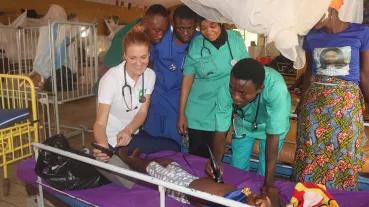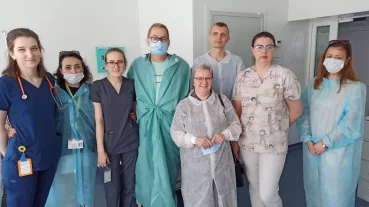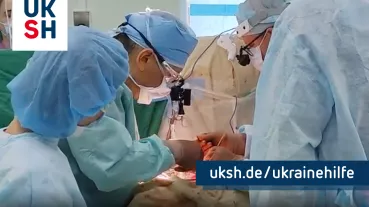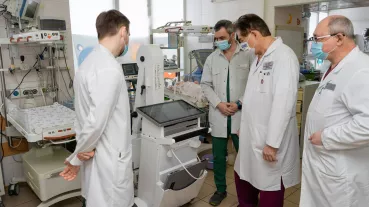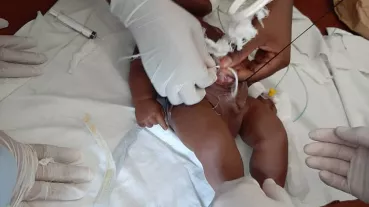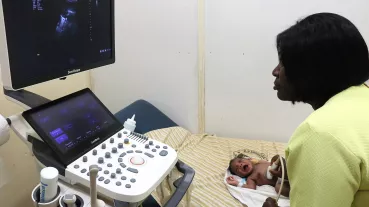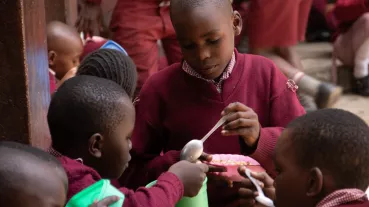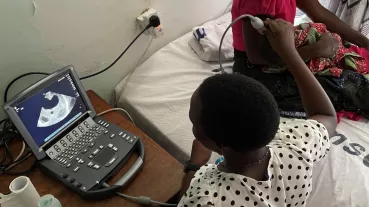Paediatrics
|
Malawi
|
The Malawi Else Kröner child health programme: levering synergies for prevention and care
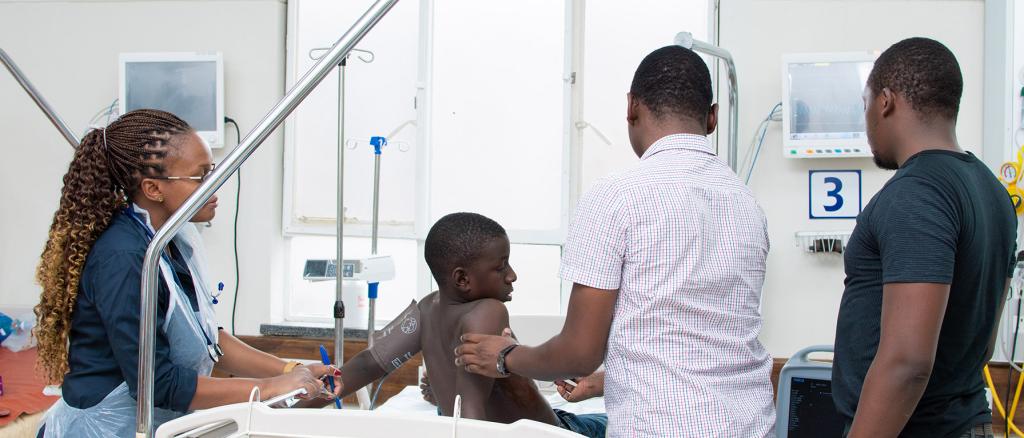
Dr Watipaso Kalizang'oma, paediatric registrar, Dr Chisomo Kadammanja and Dr Rashid Ngalawango, both radiology registrars, during a point-of-care ultrasound exam of the chest and lungs of an adolescent at Queen Elizabeth Central Hospital, Blantyre, Malawi
(© Zeeya Creations, Lilongwe/Malawi)
Situation:
Infectious diseases and infant mortality are falling in Malawi thanks to targeted programmes. However, high population growth and epidemiological change pose major challenges to the health system. Screening, prevention, diagnosis and treatment of chronic and non-communicable diseases (NCDs), injuries and disabilities are becoming more important.
Objectives:
To improve child health in Malawi and to achieve the relevant sustainable development goals, evidence-based, locally relevant child health interventions, especially for NCDs, will be provided and synergies will be used in guideline and training development, implementation and monitoring.
Indicators:
- Years 1-2: Capacity building for programme leadership, consensus building among national actors and partners, development of guidelines, training and Information, Education and Communication (IEC) materials, app and Monitoring & Evaluation (M&E) infrastructure.
- Years 3-4: Training and implementation of guidelines with on-the-job training, mentoring and supervision, deployment and piloting of an innovative app.
- Year 5: Consolidation of all processes and procedures, analysis and evaluation to measure impact.
Measures:
Core components of the programme are:
- Guidelines that represent a high standard of child health care, combined with an M&E system that promotes accountability, serve to improve service quality.
- The evidence-based, multi-layered approach to effective training under the local leadership of PACHA and KUHeS, as well as postgraduate training for paediatric residents, sustainably strengthen health workers and the local health system.
- Implementing the guidelines first in districts with the highest burden of disease improves the accessibility of services.
- The process of developing and implementing the guideline and training packages involves all child health care stakeholders in the different departments of the Ministry of Health, KUHeS and PACHA - a nationwide consultation promotes local networks.
- The use of an innovative app facilitates interactive training, guideline-compliant care and collaboration between health professionals.
- The programme applies scientific methods to study its effects.
Sustainability:
Factors that support sustainability:
- The programme's objectives and strategy are the result of a needs assessment and consultations by local Malawian child health experts. They correspond to national, bilateral and global health priorities.
- The programme involves different professional groups, fosters links between them and works across disciplines. The awareness-raising component increases demand for specific services in the communities. Thus, the programme avoids an isolated, stand-alone approach, and paves the way for sustainability.
- The programme is evidence-based. The new guidelines and training packages are based on the latest technical evidence and standards - tailored to the Malawian context.
- Health, especially of children, is closely linked to development and prosperity, the basis for the long-term development of the country.
Special features:
- The development processes for guidelines, training packages, app, communication strategy, piloting of implementation and M&E are closely linked.
- Activities emanate from and strengthen national structures (PACHA, Ministry of Health)
- Focus on NCD
